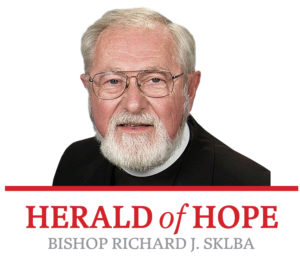BISHOP RICHARD J. SKLBA
New beginnings can come at unexpected moments and even catch us off guard at times. Suddenly at the  end of summer, for example, the prospect of another school year inevitably has that effect, both for teachers and students. A fresh friendship or a new job creates that same impression, whether it be mid-March or even November. Most fresh starts depend on experiences of the human heart, not the calendar.
end of summer, for example, the prospect of another school year inevitably has that effect, both for teachers and students. A fresh friendship or a new job creates that same impression, whether it be mid-March or even November. Most fresh starts depend on experiences of the human heart, not the calendar.
Israel’s three most ancient festivals (Deuteronomy 16) were Passover to commemorate their spring escape from Egypt, the Feast of Weeks (or Pentecost) for the first harvest and Tabernacles for the final harvest in autumn. Later (perhaps in light of Israel’s exposure to the Babylonian customs during the Exile in the sixth century BC), the New Year and its penitential partner, Yom Kippur, were added to the ritual sequence.
This coming Sunday evening, Sept. 29, our Jewish sisters and brothers throughout the world will pause to celebrate the beginning of a new year, Rosh Hashanah as they call it, the head of the year numbered 5780 from creation, according to the calculations of the ancient rabbis. They will gather after sunset, because that is the traditional biblical take on when the new day begins (not at sunrise, as our western mentality might assume). Every new day starts therefore in the mysterious darkness of God’s creation, but a new year is unique because Judaism has a vivid sense of God’s personal involvement for the entire world, both scattering divine gifts and dispersing judgment each year.
The spirit of their feast is much more sober than that of their gentile neighbors at the beginning of January each year. The reason is simply that New Year’s Day in the ancient Jewish calendar is the annual occasion when God is believed to write out a new year for each individual; so a faithful Jew takes a hard look at the past and assesses it from God’s point of view. Because God does his review in response to our behavior over the prior year, faithful Jews pause to realize that God is busy writing a new year for each of us at that time, blessing or admonition as circumstances demand, and they quickly try to put things aright.
Shortly thereafter (beginning this year on the evening of Tuesday, Oct. 8), they then celebrate the feast of Yom Kippur, the annual day of penance for the sins of the world, personal and communal. That would conclude about eight days of serious moral conversion in preparation for this feast of Atonement. Their theory is that a loving God and benign Father would see people’s efforts, even if the prior year was less than stellar, and write a new year of blessings accordingly.
The timing of this sequence has not always been the same for Judaism. At the very beginning, their new year began with the spring movement of sheep to fresh pastures, and Passover each spring was dated from the first month (Exodus 12:2). Sometime during the Babylonian exile, Judaism adopted the calendar of their captors and shifted their calendar accordingly, so that the new year became a feast of autumn after the harvest when fields were cleared in preparation for new sowing and filled with hope for the future.
This year, on Thursday evening, Sept. 26, I will be honored to receive the Lux Center’s Thering Award for the work I’ve been blessed to share in a very small way over the years, namely the common effort of Jewish and Catholic communities to find a fresh start in mutual understanding and new cooperation for the healing of our world. After so many centuries of mutual recrimination, and certainly spurred by the unspeakable horrors of the savage Nazi efforts to eradicate Judaism from our world, we again have stood side by side before God. Years ago, with rabbi friends, I walked through the God-awful grounds of Auschwitz and heard the faint echoes of Jewish and Christian cries for redemption and reconciliation.
Sr. Rose Thering was a Racine Dominican who found a vocation in reviewing our Catholic catechetical materials and heroically confronting the ancient anti-Semitic currents contained therein. To have been honored this year for sharing in so small a way the efforts of so many extraordinary people from around the world in the work of restoring mutual respect is very humbling for me.
The whole Catholic world has embraced this effort, each of us doing our small part to renew our very broken world in need of healing. This fall, our own Cathedral of Saint John the Evangelist is sponsoring a series of presentations directed to that same goal, the healing of ancient wounds.
May Jesus the Faithful Jew who redeemed the world by his suffering bring a new beginning to our healing and hope. As the Jewish greeting this time of the year would say it, “may we all be written for a good year.”
